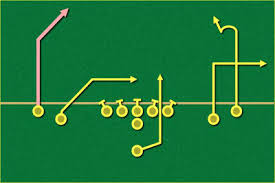记忆方法
将“offense”分解为“off”和“fense”,想象自己“off”做了一件让人感到“fense”(防守、防御)的事情,导致对方产生了不满或抵触,从而记住“offense”意味着冒犯或罪行。
以上内容由AI生成, 仅供参考和借鉴
中文词源
offense 冒犯,进攻,前锋
来自offend,进攻,冒犯,-s,过去分词后缀,此处做名词使用。引申词义前锋。
英语词源
- offense (n.)
- late 14c., "hurt, harm, injury, pain," from Old French ofense "offense, insult, wrong" (13c.) and directly from Latin offensa "an offense, injury, affront, crime," literally "a striking against," noun use of fem. past participle of offendere (see offend). Meaning "action of attacking" and "feeling of being hurt" are both first recorded c. 1400. Sense of "breach of the law, transgression" is first recorded late 14c. Sporting sense first recorded 1894.
权威例句
- 1. Between plays the coach was talking to the offense in the huddle.
- 中场时,这位教练对围拢一圈的进攻队员进行战术指导。
- 2. to commit an offense
- 犯罪
- 3. I hope you will not take any offense at my words.
- 对我讲的话请别见怪.
- 4. Child abuse is a punishable offense.
- 虐待儿童是一种该受惩处的违法行为.
- 5. His words gave great offense to everybody present.
- 他的发言冲犯了在场的所有人.

